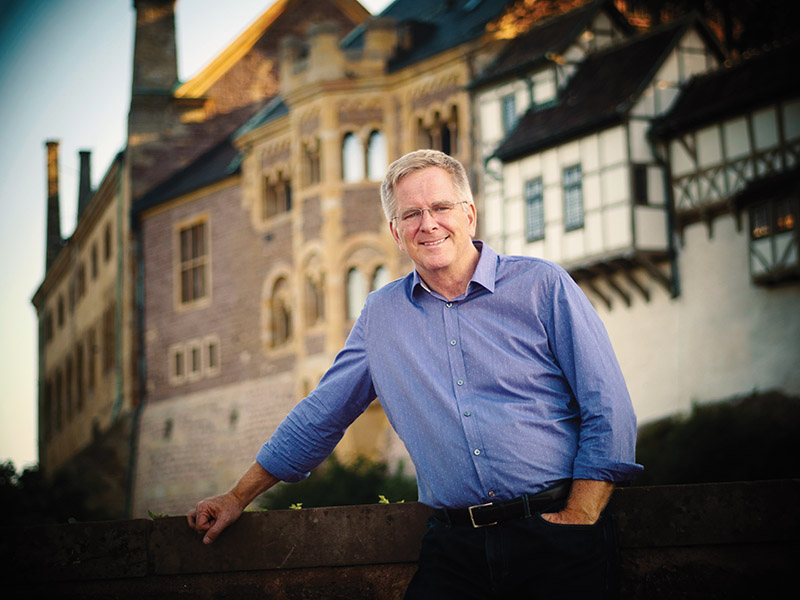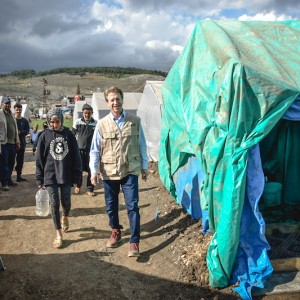Rick steves is no stranger to Bavarian beer halls, Sicilian street festivals, Dutch chocolate paired with Dutch marijuana, Mediterranean sunsets, Scandinavian museums, feisty Irish goats and stealthy Parisian gypsies. As host and writer of the popular public television series Rick Steves’ Europe, and best-selling author of more than 50 travel guide books, Steves urges fellow Americans to travel smart, affordable and mindful. Become “temporary locals,” he says, by connecting more intimately and authentically with a country and its people. Upon taking his first trip across the pond in 1969 to visit piano factories with his father, who was a piano importer, Steves has seen the continent and its sweeping array of climates noticeably change over the last five decades. Consequently, he’s become progressively vocal the last few years on the dire need for Americans to fit better into our planet and be more aware any time they pass through a customs checkpoint. The intrinsic benefits of international travel have their costs. The more wanderlust the footprint, the heavier the contribution to warming up the atmosphere. One round-trip flight from the US to Europe emits roughly as much climate-changing carbon, per passenger, as six months of driving. But to simply stop traveling and stop seeing the world would be the wrong solution, he says.
Last season, Rick Steves' European tour company implemented an initiative to mitigate each member’s carbon footprint. In an effort to balance the system, the company now counteracts its environmental impact by taking a portion out of its profits and imposing a tax on themselves. “I made too much money last year,” Steves admits in a press conference at the recent Ringling College Library Association Town Hall Lecture Series. “Because the way our government taxes us, we don’t have to pay for our carbon. So, I gave myself a self-imposed carbon tax of $1 million and I gave it in 10 $100,000 checks to 10 different nonprofit organizations working on climate-smart agriculture in the developing world.” Poor farmers working in poor countries make up half of the people in this world, he says. And although they live off $2 to $5 a day, they still contribute to climate change. “If we focus on improving the lives of families in the developing world, and help them do their work in a way that contributes less to climate change, we’re doing a good thing.” Steves shares also that accepted science across the board by experts shows that if you invest into some kind of climate-smart plan, you mitigate one person’s round-trip flight. As a tour operator who took 30,000 people to Europe last year, “I made a lot of money,” he admits. “I should have had $30 per person more cost to do that ethically.” So, Steves extenuated his company’s carbon footprint by taking 30,000 people, times $30, to come up with $900,000 (rounded up to $1 million). “I’m excited about this program because all my travelers know now they’re flying carbon neutral.”
It’s grassroots, it’s proactive and it works. But Steves doesn’t want a pat on the back or to be called heroic. He doesn’t even want kudos for the concept. “Steal this and do not credit me,” he says. “Just take this idea and put it in your own company. We all got to get serious about climate change.” The program has since encouraged him to travel less to first-world European cities and more to the developing third-world countries for some eye-opening culture shock. He’s met with discouraged farmers, walking with them in their parched fields, learning the overwhelming, demoralizing reality of struggling to get by through droughts. And when rain does come, it comes in torrents and washes away the nutrient topsoil. He’s learned that hunger seasons historically start in April, and now they’re starting in February. “It’s the poorest people in the poorest countries that are suffering the most from climate change—not us—we can move to high land and put on sunscreen.”
Steves urged the room to go to Europe and see it firsthand, just in everyday travel. “I’ve missed two planes in Frankfurt in the last couple of years because the airport had to close from monsoon thunderstorms,” he says. “That’s never happened before in my life. Now, it’s 90 degrees and humid every afternoon—all that humidity builds up and comes down in a monsoon. That’s something new in Germany. Germany’s never had air-conditioning. Now they need air-conditioning.” On his recent expedition to the top of a cathedral in Leon, France, he noticed many of the gorgeous, ancient slate tiles on the roof were cracked from the heat and reinforced with slabs of duct tape. Hiking in the Alps, he couldn’t help but notice giant pods and reservoirs. When inquired, he was told, “We can’t build a ski lift anymore without plumbing it for snow-making machines. They used to have plenty of snow. Now they don’t.” Meanwhile, at the Bowlerina in Spain, bull fights have been moved from the daytime to a later, shadier time of night because the sun is simply too strong to perform at the traditional time anymore.
“Climate is changing,” he states. “The family of nations is working very hard to fight that. But there’s one powerful nation that’s not on board: ours. And that’s the one thing I’m ashamed of when I travel. America is more interested in its quarterly profit statements and its stock market than in the future environment for our kids to be able to enjoy traveling when it’s their turn.”










